- Home
- Joy Dettman
Diamonds in the Mud and Other Stories Page 19
Diamonds in the Mud and Other Stories Read online
Page 19
During that era they were shipping them into Australia by the thousand and sending them in packs to country towns. Most of our lot were employed, in what they liked to call the timber gettin’ industry, which meant the bush and sawmills; the town was surrounded by red gum forests. There was reffo doctors, lawyers, one bloke that played the violin good enough to be on the radio, but they put him and the rest to work cutting down trees and doing what they were told to do for three years.
I remember the violin-playing one real well. He lost half his hand to a saw, chopped it clean off. The day they let him out of hospital, he pitched his violin in the river. It was the only item he brought with him from wherever he come from, and that night the poor coot hung himself. I can still hear his mates jabbering when they carried him into town. We didn’t need to understand their lingo that day.
Anyway, mustn’t get sidetracked here. We finally set the date for the house raising and come seven o’clock on the Saturday morning, I drive down to the widow Wilson’s property, eager to get cracking – and the only movement there is the widow’s chooks scratching for their breakfast in the yard. At nine the Davis twins and their crew of reffos turn up with half a house hooked on to the back of a log buggy, so in I go to town reckoning there’s been some mix-up with the meeting place, expecting to see a mob of blokes expecting a lift down.
The town’s a proper hive of industry. There’s three mongrel dogs, two Aboriginal kids, Mrs Crump settling the dust on her bit of footpath and Willie Watson supporting one of the pub’s veranda posts, playing cockatoo for Percy Porrit, the SP bookie. If I ever hated a man, I hated Watson. He reminded me of the red-headed mongrel that run off with my missus.
I sort of nod affably.
‘Picked an ’ot one for it t’day, Bob,’ he says, his trousers hitched, hands darting in and out of his pockets, head swivelling in a near circle.
‘Too hot for you, I take it,’ I say back. ‘You had me fooled, you know. Here I was thinking you at least was a good friend to Jim Wilson.’
His mouth opens in a grin, displaying one lone pearl in a diseased oyster. ‘Yer, I were like. I broke the news to his poor bloody missus.’
‘So, where was you at seven – you and the rest of the town what was so bloody concerned for his poor bloody missus and kids a while back? I been down there for two hours, me, the Davis twins and the reffos.’
Willie licked at his lower lip, his tongue darting on either side of his lone tooth. His work-stained hand scratched at his ribs through a convenient hole in his sweater while he looked everywhere but at Percy Porrit’s vehicle, which increased its speed as it bypassed the hotel yard.
‘Wave the bugger in,’ I say. ‘You’ve got half an hour to place your bets, then if every man jack on my list doesn’t show up at the widow’s, Percy will be spending next Saturday in my lock-up and you with him. You get my drift?’
‘I got ya. Yeah. Too right. Least we can do fer a good woman – least we can do, Bob,’ he says.
They all called me Bob, except the widow. Any rate, within the half-hour, Watson turns up with eighteen blokes and work gets underway.
We had to knock down the chicken-wire fence. Chooks overran the widow’s vegie garden, but the donated rooms, complete with veranda, windows, doors, and white ants, were jacked in beside the lean-to kitchen. What no one considered was the stove flue which was now smack up against the new lounge-room wall.
‘It will go up like a bonfire the first time she lights that bloody stove!’
‘We’ll shove a bit of asbestos behind it.’
Everyone threw in his ha’penny’s worth, until Lefty Davis gets bored listening and does his block, and I’ll tell you straight, I wouldn’t’ve missed it for quids. He ripped that stove out singlehanded. Built like a tank, he was, with a face that looked as if it had been run over by one. A bit of the flue falls off and lands on his foot, so he pitches it like a javelin into the yard and it hits one of the reffos, who takes it personal.
Lefty Davis didn’t get his nickname by making daisy-chains with his left hand. He’s into them, the whole pack of them, and the back wall of the widow’s lean-to cum kitchen is down, taking a couple of reffos with it. He’s got two more under his gorilla armpits, and he’s about to run them, head first, into the donated rooms, when Harry, a bricklaying reffo who’s armed with a bucket of water to mix his mortar, lets Lefty have it. Most of it hit a wheat bag curtain which the widow had been using as a kitchen door.
When the dust settles, we feel it almost immediately. We’re standing in this wide passageway between two solid enough constructions, where there’s a pleasant breeze blowing in through that wet wheat bag and out the knocked-out end, cooling that area by degrees. It’s like standing in a Coolgardie safe – the ideal place for the sandwiches, supplied by the ladies, and the nine gallon keg of beer donated by Mick Lawton, who due to business commitments couldn’t attend. He’d sent his brother down with the keg; apparently the brother himself used to be a builder before he got half his brain blown out in the war.
What I’ll never understand is why we let that poor fool design the widow’s new kitchen. Incapable of walking a straight line sober, Simple Simon Lawton attempted to step out, heel to toe, the blueprints of a replacement kitchen while thirty-odd advisers, having first helped themselves to any receptacle capable of holding fluid, urged him on.
It didn’t take long to empty that first keg, so when the truck was sent back to town to buy the hardware merchant’s entire stock of asbestos sheeting and roofing iron, the driver was given instructions to exchange the empty keg for a full one. The rehousing fund was shouting.
By three pm Simple Simon was up the ladder, attempting to wed the beams of the new kitchen roof to the donated building’s, which was not eager to form a union. The bedroom, formerly a grain shed but now sporting a dividing wall and two mismatched windows that wouldn’t open, didn’t plan on wedding anything.
So it gets to three thirty, and old Harry, that water-throwing reffo, quietly occupied in creating a masterpiece fireplace and chimney for the donated lounge room, runs out of bricks.
‘I told yer you was building it too bloody big,’ Lefty Davis roared. ‘I told yer you wasn’t bloody creating a lodge fer the bloody Tzar. We give ya plenty of good bricks and ya waste our bloody good bricks. No more da bloody chimney no more da bloody beer, you crazy old reffo bastard. You savvy me?’
Harry nodded, smiled, Lefty’s tirade non translatable into any one of the tongues the old bloke had picked up in concentration camps, refugee camps or timber camps. Still smiling, he walks off for another bucket of water, and gives it to Lefty, in the face.
All hell breaks lose – until Simple Simon, who’s got no head for heights, alcohol, or much else, falls off the ladder. When another bucket of water won’t bring him around, they toss him dripping into the back of the police van.
You’ve got to remember, they’re all drunk as skunks. It’s been a long, hot day and the beer is free. I leave them to it and head for the hospital, twenty bumpy, dusty miles away. Simple is not complaining. I hope he’s not dead but I don’t hang around to find out. I offload him at the hospital and I get back to the job.
And the buggers have run out of roofing iron, and there’s no more to be had in town. They’re considering pulling down the widow’s best chookhouse, but it’s more rust holes than solids. I stand and curse each one of them, and the widow, and Simple Simon’s bloody design, what any fool could see was more fitting for a shearing shed than a farmhouse bloody kitchen.
The roofing crew, having no material to roof with, decide to cement the floor of the new passage, ex lean-to cum kitchen, with the dozen or so bags of rock solid cement someone donated. Anyway, while I’m back in town helping to rip down a corrugated iron shed at the showgrounds, they’re mixing lumps of cement with sand barrowed up from the river bend. They’ve got no mixer, no form-work, nothing, but they’re mixing cement and shovelling it, hoping it will find its own level, and it’s trying, it�
�s trying; it’s running downhill as fast as they can shovel the bloody stuff back.
To cut a long story a bit shorter, by six that floor is flat enough and setting where it is so they call it good enough. We’re exhausted rabble. We’ve got one window left over which we fit in the cement-sheet wall of a kitchen that’s gotta be near thirty foot long, and we’re fitting in it one lone two foot by two foot window.
The sun is well down, the bats and mozzies flying, we’re cleaning up, counting heads, and we find four of the reffos in the grain shed, now two bedrooms, where they’ve been having a siesta. They’re trapped, due to the windows don’t open and the cement floor in the breezeway is wet. The cementers won’t let no one near their new floor and the reffos can’t understand plain English, so when one of them steps into it, marring its perfection, the language gets interesting.
Me and Max Davis end up cutting a doorway down the end of the south bedroom to let the silly buggers out. Now we’ve got four doorways to fill and two doors to fill them with, but worse than that, Willie Watson, who went into town to pick up a ton more sandwiches the ladies had supplied, finds out his horse has come in at twenty-five to one. He comes back with an eighteen gallon keg, and you can bet your back teeth that him and his mates won’t be moving from the widow’s land until that keg is empty.
A few of us got the widow’s stove propped into its gap, a few more carried those two doors back and forth, trying to find a gap they’d fit – and when they wouldn’t fit any gap, Lefty pitched ’em into the yard and Max dragged ’em back. In the end we fixed one to the kitchen and the other one to the south bedroom – one wouldn’t shut and the other one wouldn’t open. In the meantime there’s brawling, there’s name-calling in ten different lingoes, those reffos now drunk enough to start world war three. Me and the sober citizens had to empty out me lock-up then refill it, you might say.
We finished up around midnight, by lantern light, and I tell you straight, I never seen so much muddling activity by so many achieve so little. As me and a few semi sober blokes scraped up drunks and carried the better pieces of furniture inside, the Davis twins stood looking at their day’s work in awe. Me – I just wanted to get out of town.
Come the next day and I’m fragile, dying of a hangover or sunstroke. Me head is made out of cracked eggshell, held together by membrane; it didn’t want to rise from me pillow – and by the living bejesus, the rest of me did not want to face that widow. Of course, I had to, so I swallowed four aspros and a pint of coffee, felt my way out to the lock-up where six or eight of me prisoners were snoring and the other six or eight stood hammering on the door, threatening to break out and turn cop killer. I tossed them the key and ran for my van, heading for the widow’s now familiar track.
She was in the chook yard, sorting through the pile of junk transferred from me veranda and lock-up. Holding my scalp down, hoping I’d drop dead of a stroke before I got there, me bruised eyeballs fixed on the abortion I’d helped construct. I suppose I wasn’t seeing too straight where I was driving and I ran over one of her chooks.
‘You’re on its wing,’ she called. ‘Run your wheel back a bit, officer.’
I did as she said, cowering there while she walked to me van, stooped, picked the squawking fowl up by its legs then, with a minimum of movement, placed it on the chopping block and cut its head off with the wood axe.
‘Another beautiful day, constable,’ she said, tossing the fowl down, watching the headless bird attempting to fly.
‘About the house,’ I say, striving not to look at the gout of red raining down on white feathers, but looking anyway, aware that my own head was next for the chop, and at that moment I might have been happy to place my neck on that block – at least it might’a fixed me headache.
‘I’ve got a plumber coming to put up a bit of spouting on Monday and we’ll slap a coat of paint on for you next Saturday – maybe do something about lining that kitchen . . . ’ I start, but sort of run out of steam halfway through. What more could a man say?
‘I don’t know how you got it all done in one day, or how I can ever thank you.’ She looked again at the chicken that now lay on its side, flapping one wing spasmodically. ‘Would you like it? I’ll dress it for you, constable.’
‘No! No!’
‘It won’t keep in this weather.’ She eyed me, head to one side. ‘You look worn out. A good home-cooked meal is what you need after your hard day’s work. Would you like to join us for dinner tonight in our lovely new kitchen?’
She was wearing a faded floral dress, her long hair tied at the nape of her neck with a bit of ribbon. No backwoods widow weeping in her mourning rags, the widow Wilson was still a fine looking woman. Her waist may have been donated early to child bearing but it flared into well rounded hips. I’d always been a hip man.
‘I thought I might invite the Davis twins down for a meal too. Would you rather all come down together, officer?’
‘No! No! Tonight will be good,’ I say fast. ‘Tonight will be real good, Mrs Wilson.’
‘Six o’clock then,’ she said. ‘Jim always liked to eat at six.’
‘Six it is. I suppose it doesn’t look too bad from this angle,’ I say. ‘With a bit of paint and spouting, a few doors . . . ’
‘We left a grain shed yesterday and returned to a mansion,’ she said. ‘God works in mysterious ways, his wonders to perform, officer.’
‘He certainly does that . . . and Bob’s the name. Call me Bob,’ I say.
She never did get to call me Bob. I never found her husband’s carcass neither. Just as I was getting real friendly with his missus the bludging bastard come home, didn’t he?
The Interrupted Circle
Number eighty-two Hill Street was a nondescript weatherboard, exactly halfway between High Street and Lower Road. The generation before Arthur Thomson had walked up the hill in the morning and gone off to work. The generation after him walked down the hill each night to party. Not Arthur. At thirty-seven, he was one of the lost generation who knew neither work nor party. A shy, plump youth, he’d evolved into an obese and withdrawn adult, television his tutor, food his one comforting constant, but it was the bus stops at the top and bottom of Hill Street that saved his life.
Lunch was prepared early by Mother at number eighty-two, and by one thirty Arthur was off down the hill to catch the orange bus to the local fish’n’chip shop.
‘It would do you more good if you walked up that hill, lad,’ Mr Morris called from number fifty-six.
‘Afternoon, Mr Morris.’ Arthur waved and continued on downhill.
‘Oh, Arthur, do you think you could pick me up a couple of tins of cat food, love?’ Mrs Wilson called from number thirty-eight.
‘Pilchards in aspic again, Mrs Wilson?’
‘Yes, he’s still eating that one. He’s gone right off his beef and liver though.’
Arthur liked cats, but he couldn’t have his own. His mother had many allergies.
At the fish’n’chip shop he ordered a piece of flake, two dollars’ worth of chips and six potato cakes, which he ate in the bus shelter while waiting for the green bus that would transport him to the supermarket. A great time filler, that supermarket, he enjoyed browsing there. His selections were made slowly, placed carefully in his trolley. Cat food, biscuits, a litre bottle of Coke, bread, bananas, a packet of Violet Crumbles and one of Tim-Tams. By three fifteen Arthur was out and wandering the centre, eating chocolate Tim-Tams, sipping Coke and looking in windows. His day always ended out front of Jayson’s Menswear where he stared hopelessly at stone-washed jeans and suede jackets, locked away from him behind plate glass as surely as he was locked away from life.
At four forty Arthur waited at the bus stop to board the blue bus, which dropped him off at the intersection of High and Hill Street, leaving gravity to assist him down the hill and home to –
‘Arthur! Arthur!’ Mother’s voice came from the telephone box. No phone bills for her; she had her own private box, two metres from her front ga
te. Here she spent her days giving free advice to government departments, radio stations, neighbours with barking dogs and the parents of teenagers. ‘So you’re finally back then, Arthur, and where have you been to this ungodly hour, and have you been into those . . . ?’ Like a cork from a bottle, she popped her bulk out onto the footpath, inhaled deeply and continued:
‘ . . . chocolate biscuits again, Arthur, and how many times have I warned you, and will you keep your trousers pulled up. You’re showing half your bum crack to the neighbours . . . ’
‘Sorry, Mother,’ Arthur replied. With chubby inept hands he hitched up his tracksuit pants and prodded ineffectually at his top. He never argued. Mother left no space for argument. Like his father, Arthur had learned to keep his replies brief, contrite, and to fit them only into Mother’s inhalations.
Her mouth regurgitating old insults, she led the way down the drive and around to the back door, Arthur stepping where she trod, her control absolute.
A thin wall separated Arthur’s bed from his parents’. Mother, unable to tolerate the silence of sleep, snored all night with open-mouthed, rafter-rattling abandon. Father, a slim and silent shadow, had a snore small enough to match his stature. It was an apologetic snort of air, a furtive triple snatch of low grade oxygen, stolen from between his wife’s massive intakes. Once grasped, Father pursed his lips around his stolen sip, attempting to hold it prisoner. But his wife’s snore was a gluttonous thing, greedy for air. It created a vacuum within the room, sucking at her husband’s pursed lips until they popped, allowing his snore to leak away in a long and high pitched whistle.

 The Hope Flower
The Hope Flower Trails in the Dust
Trails in the Dust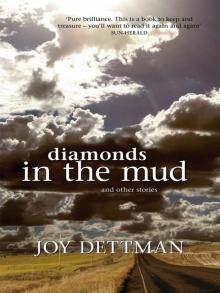 Diamonds in the Mud and Other Stories
Diamonds in the Mud and Other Stories Moth to the Flame
Moth to the Flame The Tying of Threads
The Tying of Threads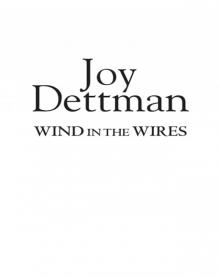 Wind in the Wires
Wind in the Wires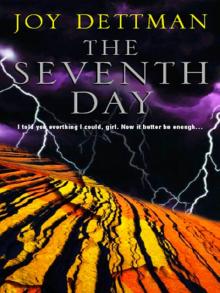 The Seventh Day
The Seventh Day Thorn on the Rose
Thorn on the Rose Jacaranda Blue
Jacaranda Blue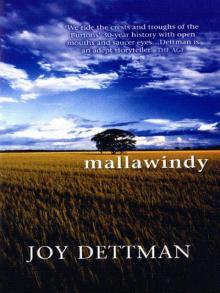 Mallawindy
Mallawindy Ripples on a Pond
Ripples on a Pond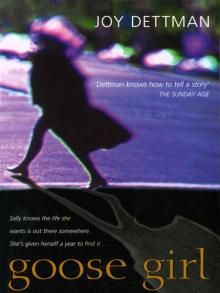 Goose Girl
Goose Girl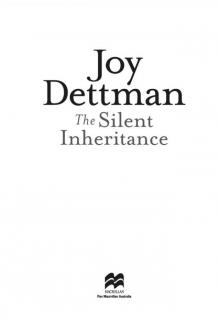 The Silent Inheritance
The Silent Inheritance Henry’s Daughter
Henry’s Daughter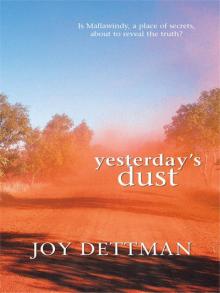 Yesterday's Dust
Yesterday's Dust Pearl in a Cage
Pearl in a Cage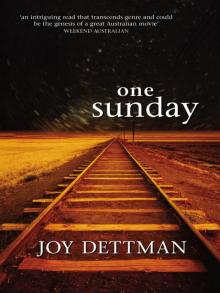 One Sunday
One Sunday